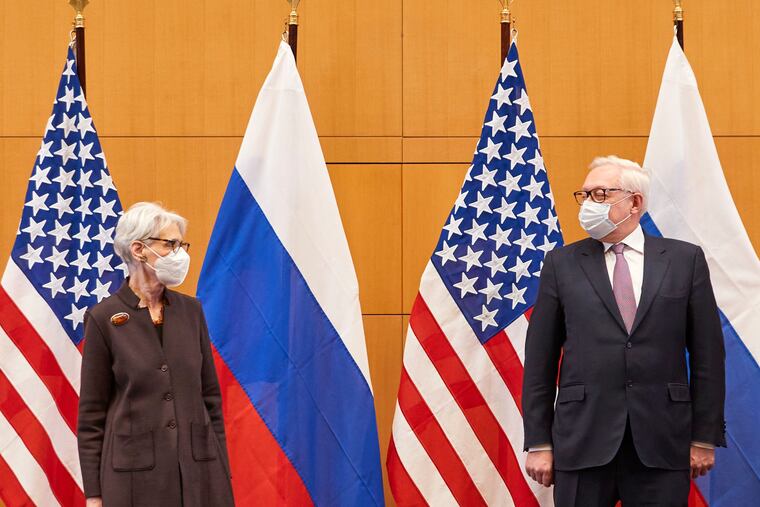Putin wants to reestablish the Russian empire. Can NATO stop him without war? | Trudy Rubin
Russia's military threat to invade Ukraine is the test case for whether Putin can redivide Europe.

This week, Western nations have been trying to rebuff Russia’s threats to invade Ukraine for the second time in eight years.
The talks between the United States, NATO, European officials, and their Russian counterparts in Geneva are an effort to tamp down Moscow’s military blackmail — and prevent another Kremlin effort to change European boundaries by violence. The talks are not going well.
With 100,000 Russian troops massed on Ukraine’s borders, the Russian government has insisted that NATO should officially cave to an impossible series of demands that would effectively return control of Eastern and Central Europe back to Moscow. The Biden team and allies have refused but offered further talks to reassure the Kremlin that NATO has no quarrel with a peaceful Russia.
So the stakes of this geopolitical chess game are much bigger than Ukraine’s future. (Although Ukraine is the critical test case.) And the game revolves around Vladimir Putin’s visceral desire to reestablish the Cold War dividing lines between East and West. He wants to rebuild the former Soviet sphere of influence that extended from Central Europe through Central Asia, and views this effort as a restoration of Russian greatness.
» READ MORE: Can Biden and NATO prevent Putin from invading Ukraine? | Trudy Rubin
“Putin wants to rebuild the Russian empire as his legacy,” says Alexander Vershbow, former U.S. ambassador to Russia and deputy secretary general of NATO. “We have to figure out whether he can be stopped.”
The Russian leader, a former KGB colonel, has never disguised his bitter feelings about the collapse of the Soviet Union. He famously said, in his 2005 state of the nation address, “The demise of the Soviet Union was the greatest geopolitical catastrophe of the century.”
In the decade since he took power, Putin has tried to reestablish a degree of Russian control — by force — in now-independent countries he believes were unfairly ripped from his nation’s historic land mass.
Russia invaded Georgia and maintains troops in ethnic enclaves there, as well as in a corner of Moldova. It now has effective control over Belarus via its Russia-dependent dictator. And Putin just sent 2,200 troops to Kazakhstan to help another Russia-friendly leader pull a coup and massacre hundreds of demonstrators.
And then there is Ukraine, where Russia invaded in 2014, annexing Crimea and setting up Russian proxies in the Donbas region of eastern Ukraine. As always with Putin’s military threats, the excuse was that he was protecting Russian-speaking locals against popular “color” revolutions secretly organized by the United States and NATO to overthrow pro-Russian local leaders.
Baloney. I was in Ukraine for weeks following the 2014 Maidan uprising that led to the hasty flight of President Viktor Yanukovych. This was a genuine civil revolt against Yanukovych’s kowtow to Moscow in refusing to permit the country to draw closer to the European Union.
As for “protecting” Russian-speaking Ukrainians, the leaders of the so-called Donbas “revolt” in 2014 against the Kyiv government were sent from Moscow, and it was fomented with Russian assistance and weapons.
Putin’s motivation then, as now, was to reestablish a hold over Ukraine by retaking territory and destabilizing its government. He believes, as he wrote last year, that Ukrainians and Russians are “one people,” and that the formation of an ethnically Ukrainian state hostile to Moscow is “comparable in its consequences to the use of weapons of mass destruction against us.”
Yet, it is Moscow that has massed weapons along the border of Ukraine, against a country that presents no physical threat to Russia. It is Moscow that has moved missiles to Kaliningrad, a Russian province on the Baltic Sea between two NATO nations. It is Putin who is making threatening moves elsewhere in Europe.
There is no prospect of NATO admitting Ukraine in the foreseeable future, nor would NATO put offensive missiles in Ukraine as Russia charges. “Ukrainians recognize how problematic NATO membership is,” I was told by Bohdan Nahaylo, acting chief editor of the Kyiv Post. But, he added, Russia’s recent military actions are convincing many Ukrainians — along with neutral countries such as Finland — that they ought to try harder for membership.
“Moscow’s bellicose tone has forced Europeans to wake up to the [Russian] threat, whether bluff or real use of force,” Nahaylo added. “Putin may have gone too far this time and united the West.”
Russian threats against Ukraine have strengthened warnings from NATO members in Central Europe such as Poland about Putin’s aggressive instincts.
» READ MORE: Don't let focus on China let Putin get away with invasion of Ukraine | Trudy Rubin
A perfect example was set by Russian foreign minister Sergeĭ Lavrov when he recently tweeted: “NATO has become a purely geopolitical project aimed at taking over territories orphaned by the collapse of the Warsaw Treaty Organization and the Soviet Union.”
Former Polish foreign minister Radosław Sikorski tweeted right back: “Get this, Russian Embassy, once and for all … We were not orphaned by you because you were not our daddy. More of a serial rapist.”
The question of the hour, of course, is whether the U.S. and NATO allies can prevent Russia from assaulting Ukraine again — and whether tougher sanctions and sending more potent defensive weapons to Kyiv will be sufficient. The Russians are already threatening to quit the discussions.
But the first step toward a tough, united pushback against Putin requires recognizing his objective: to restore Russian dominance over former Soviet satellites that have become independent. That is the prerequisite for a tough enough response to convince Putin that the cost is too high.